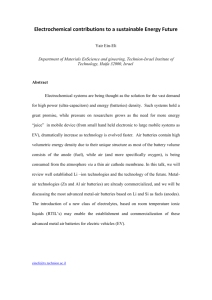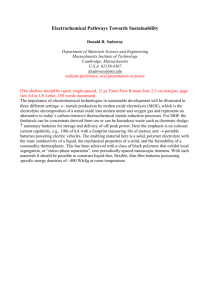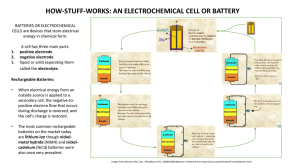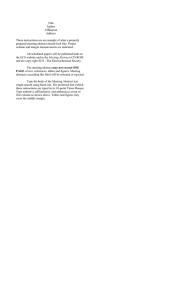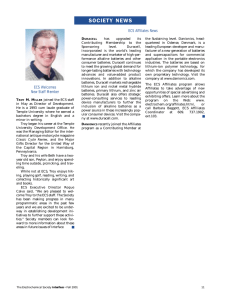TECH HIGHLIGHTS SECTION NEWS India Section
advertisement
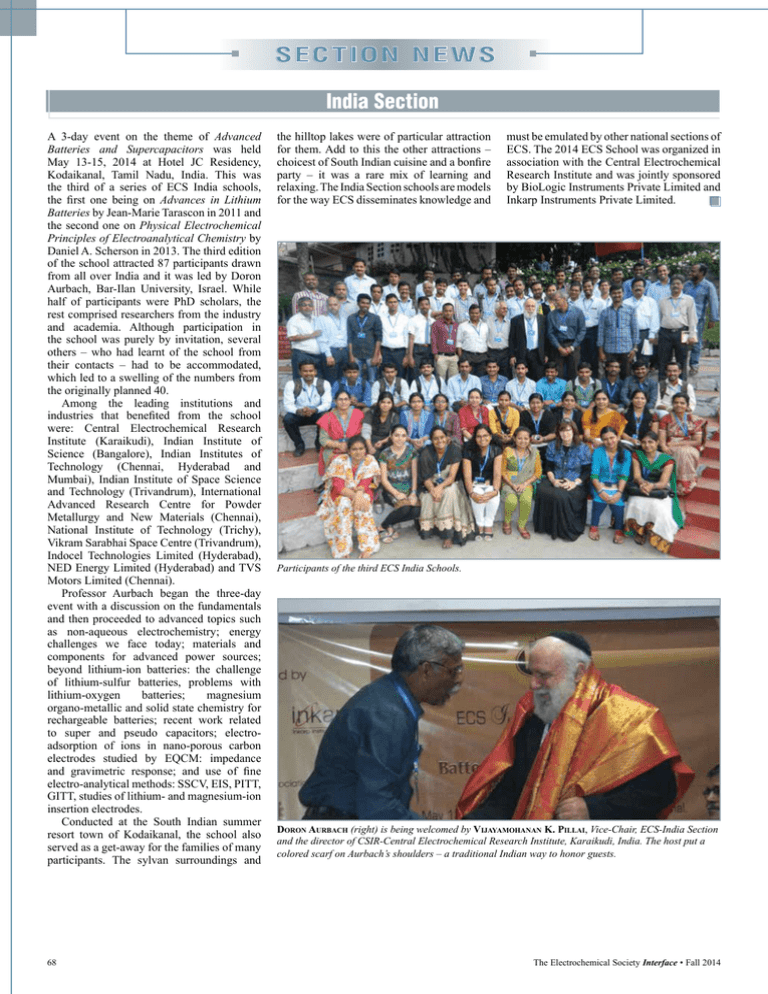
T ECH SEC TION HIGHLIGH NE WS TS India Section A 3-day event on the theme of Advanced Batteries and Supercapacitors was held May 13-15, 2014 at Hotel JC Residency, Kodaikanal, Tamil Nadu, India. This was the third of a series of ECS India schools, the first one being on Advances in Lithium Batteries by Jean-Marie Tarascon in 2011 and the second one on Physical Electrochemical Principles of Electroanalytical Chemistry by Daniel A. Scherson in 2013. The third edition of the school attracted 87 participants drawn from all over India and it was led by Doron Aurbach, Bar-Ilan University, Israel. While half of participants were PhD scholars, the rest comprised researchers from the industry and academia. Although participation in the school was purely by invitation, several others – who had learnt of the school from their contacts – had to be accommodated, which led to a swelling of the numbers from the originally planned 40. Among the leading institutions and industries that benefited from the school were: Central Electrochemical Research Institute (Karaikudi), Indian Institute of Science (Bangalore), Indian Institutes of Technology (Chennai, Hyderabad and Mumbai), Indian Institute of Space Science and Technology (Trivandrum), International Advanced Research Centre for Powder Metallurgy and New Materials (Chennai), National Institute of Technology (Trichy), Vikram Sarabhai Space Centre (Trivandrum), Indocel Technologies Limited (Hyderabad), NED Energy Limited (Hyderabad) and TVS Motors Limited (Chennai). Professor Aurbach began the three-day event with a discussion on the fundamentals and then proceeded to advanced topics such as non-aqueous electrochemistry; energy challenges we face today; materials and components for advanced power sources; beyond lithium-ion batteries: the challenge of lithium-sulfur batteries, problems with lithium-oxygen batteries; magnesium organo-metallic and solid state chemistry for rechargeable batteries; recent work related to super and pseudo capacitors; electroadsorption of ions in nano-porous carbon electrodes studied by EQCM: impedance and gravimetric response; and use of fine electro-analytical methods: SSCV, EIS, PITT, GITT, studies of lithium- and magnesium-ion insertion electrodes. Conducted at the South Indian summer resort town of Kodaikanal, the school also served as a get-away for the families of many participants. The sylvan surroundings and 68 the hilltop lakes were of particular attraction for them. Add to this the other attractions – choicest of South Indian cuisine and a bonfire party – it was a rare mix of learning and relaxing. The India Section schools are models for the way ECS disseminates knowledge and must be emulated by other national sections of ECS. The 2014 ECS School was organized in association with the Central Electrochemical Research Institute and was jointly sponsored by BioLogic Instruments Private Limited and Inkarp Instruments Private Limited. Participants of the third ECS India Schools. Doron Aurbach (right) is being welcomed by Vijayamohanan K. Pillai, Vice-Chair, ECS-India Section and the director of CSIR-Central Electrochemical Research Institute, Karaikudi, India. The host put a colored scarf on Aurbach’s shoulders – a traditional Indian way to honor guests. The Electrochemical Society Interface • Fall 2014
